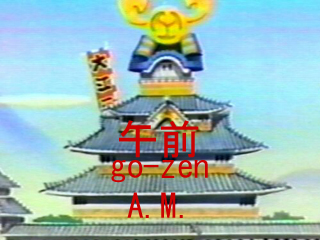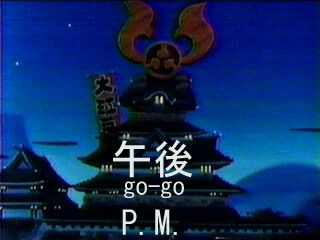 |
 |
 You might think that as long as you have a watch, you won't need to ask anyone what time it is while you are in Japan. Or, maybe you figure you'll never be able to go there anyway, so why bother? Well, you might think differently when you are at the Tokyo Station listening to hear what time your train leaves! Besides, if your watching anime and they start saying something involving time and/or dates, you can impress your friends by understanding what the heck they are talking about. You wouldn't be at this page if you didn't have an interest in learning, so learn this too. It won't be too hard, because we just got done studying numbers in the last 2 lessons. But if you missed those or need a refresher, take a while and go back. This lesson will still be here when you're ready!
You might think that as long as you have a watch, you won't need to ask anyone what time it is while you are in Japan. Or, maybe you figure you'll never be able to go there anyway, so why bother? Well, you might think differently when you are at the Tokyo Station listening to hear what time your train leaves! Besides, if your watching anime and they start saying something involving time and/or dates, you can impress your friends by understanding what the heck they are talking about. You wouldn't be at this page if you didn't have an interest in learning, so learn this too. It won't be too hard, because we just got done studying numbers in the last 2 lessons. But if you missed those or need a refresher, take a while and go back. This lesson will still be here when you're ready!Do you remember how to ask what something is with "Nan des' ka?" (What is it?)? Well, to ask the time, just add "ji" (gee) and ask "Nan-ji des' ka?" (What time is it?). "ji" is sort of used like "o-clock" in English, so, by adding your basic Japanese numbers, you can say what time it is. But 4, 7, and 9 are a bit different. Nothing too hard though.
1 o-clock = Ichi-ji
2 o-clock = Ni-ji
3 o-clock = San-ji
4 o-clock = Yo-ji (Notice it's "yo-ji", not "yon-ji")
5 o-clock = Go-ji
6 o-clock = Roku-ji
7 o-clock = Shichi-ji (or "Nana-ji")
8 o-clock = Hachi-ji
9 o-clock = Ku-ji (not "Kyuu-ji")
10 o-clock = Ju-ji
11 o-clock = Ju-ichi-ji
12 o-clock = Ju-ni-ji
Now that will get you within an hour, but what about minutes? Well, remember in the previous lesson where we talked about how some things have special ways to be counted? Minutes are one of those. The counter for minutes is "-pun" (puhn). But some minute amounts/times use "-fun" (fuhn). I've seen "-hun" (huhn) used also, but most people seem to stick with "-pun" and "-fun". Like with many of the "quantitative expressions" we learned in the last lesson, "ichi" has been shortened.
So,
Ip-pun (eep-puhn) = 1 minute
Ni-fun (nee-puhn) = 2 minutes
San-pun (sahn-puhn) = 3 minutes
Yon-pun (yohn-puhn) = 4 minutes
Go-fun (Goh-puhn) = 5 minutes
Ro-pun (Rohp-pun) = 6 minutes
Shichi-fun (sheechee-fuhn) = 7 minutes
Hachi-fun (Hachee-fuhn) = 8 minutes
Kyu-fun (Kyu-fuhn) = 9 minutes
Ju-pun (Ju-puhn) = 10 minutes
After that, the ending is based on the last number, so
Ju-ip-pun = 11 minutes
and
Ju-ni-fun = 12 minutes
Don't think you can remember all that right away? Daijobu des'! Here's an easy way; Just round off the time to the nearest 5 minutes. So, any minute that ends with a "0" will be "-pun", and any that end with "5" will be "-fun". Like this:
ni-ju-pun = 20 minutes
ni-ju-go-fun"(25 minutes)
For 30 minutes, you can say "san-ju-pun" or "han", which means "half" so for 9:30, you could say "Ku-ji han".
While we are learning time, you might also want to know "Gozen" is A.M., and "Gogo" is P.M. You can say "Asa" (ah-sah) instead of "Gozen" if you want. "Asa" means "morning", so it's like saying "6 o'clock in the morning" instead of "6 A.M.". "Gogo" can be used to say "P.M.", but it can be used by itself to just mean "afternoon" also. If you are talking about a time in the evening, you can say "Yoru" (yoh-ru) "Evening" or "Night", "9 o'clock at night".
 |
 |
Ima nan-ji des' ka? = What time is it now?
Ku-ji go-ju-ro-pun des'. = It's 9:56.
Goro gogo ju-ji. = Almost 10:00 PM.
Ima yoru des'. = It is night now.
Nihon wa ima asa des'. = In Japan, it is now morning.
Asagohan ga, itsu des' ka? = When is breakfast? ("Asa" = "morning" plus "Gohan" = "Meal". "Gohan" also means steamed rice, since rice is so important to Japanese cooking, the word has come to mean "meal", even when that meal might not actually have any rice.)
Goro gozen roku-ji han. = Around 6:30 AM.
Before you go, test yourself and see if you've learned anything after reading all this! Translate these times to Japanese. Just drag your mouse in between the * under them to check your answer.
*Ju-ji han or Ju-ji san-ju-pun* |
*Gozen Shichi-ji or Gozen Nana-ji* |
*Asa hachi-ji ju-go-fun* |
*Gogo go-ji ni-ju-pun* |
*ju-ichi-ji ju-ip-pun yoru* |